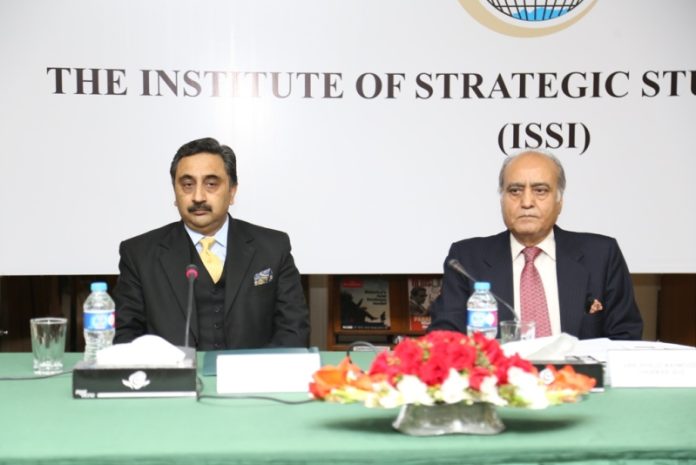PRESS RELEASE
Public Talk
on
“Pakistan-India: Avoiding a Water War”
December 14, 2016
Pakistan has mostly dealt with its water security issues from technical and political point of views, but never backed up its stance by strong legal arguments. In Pakistan, engineers and lawyers need to sit together to interpret the Indus Water Treaty (IWT) in a holistic manner. Therefore, there is a need that young scholars and lawyers should be encouraged to study water laws and develop their expertise in this area. This was stated by Barrister Ahmer Bilal Soofi, former Law Minister and Advocate Supreme Court of Pakistan at a Public Talk on “Pakistan-India: Avoiding a Water War,” organised by the Institute of Strategic Studies Islamabad (ISSI), under its Distinguished Lecture Series today.
Barrister Soofi said that during disputes, sometimes the main issue is of communicating the right message – something he felt held true with the IWT. During his presentation, he showcased the legal aspects governing the Treaty and discussed the various aspects surrounding it; including what areas it does not cover and emerging water security issues. He stated that every dispute should be looked at from five different viewpoints: customary international law; judicial decisions; academic writings; international organisations and other treaties. He stated that although the IWT has its governing text, yet there are other treaties and their texts, having customary value governing this treaty as well. It is also imperative to understand that not every water issue falls under this Treaty’s jurisdiction. Other water security issues should be tabled separately and bilaterally. He also highlighted that the termination of this treaty cannot be done unilaterally according to Article 12(4) of the IWT. The Treaty is thus, perpetual and guaranteeing in nature.
Barrister Soofi pointed out that the IWT is a regulatory framework giving technical specifications. It is confined to these technicalities and does not address the substantive decision of the number of dams that the Indian government may wish to construct. He also talked about how international law declares a positive obligation to not inflict unreasonable harm on the lower riparian state. Pakistani officials have been invoking the wrong forum. Pakistan reservations on the technical aspects of a dam’s construction will invoke the IWT’s dispute-resolution mechanisms.
Earlier, Ambassador Khalid Mahmood, Chairman Board of Governors of ISSI, in his welcome remarks said that the water security issue is a very important one. Being one of the most water scarcest countries and an agricultural economy, the stakes for Pakistan are high.
Later, Ambassador Mahmood, in his concluding remarks commended Barrister Soofi for explaining a complex situation in simple words. He stated that it istherefore absolutely imperative that Islamabad should make use of all diplomatic means to ensure that this problem is brought to the international community’s notice.













